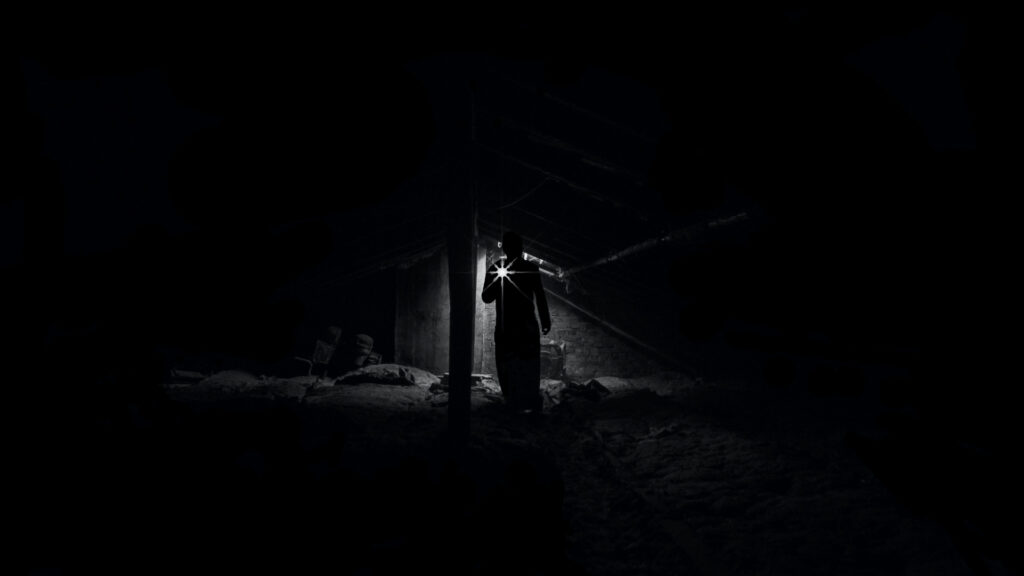Posts by reachchurch
Bond of Faith
Read This Week: Genesis 22
Abraham looked up, and there in a thicket, he saw a ram caught by its horns. He went over and took the ram and sacrificed it as a burnt offering instead of his son. So Abraham called that place The Lord Will Provide. And to this day, it is said, “On the mountain of the Lord it will be provided.” The angel of the Lord called to Abraham from heaven a second time and said, “I swear by myself, declares the Lord, that because you have done this and have not withheld your son, your only son, I will surely bless you and make your descendants as numerous as the stars in the sky and as the sand on the seashore.” – Genesis 22:13-18 NIV
As we have already discussed, Genesis is full of stories that people who claim no affiliation with Christianity or Judaism know. Chapter 22 presents us with another one of those, the account of Abraham being asked by God to sacrifice his son, Isaac. It is a pivotal narrative in this study of Genesis and the Bible. It is a gripping and agonizing story that captures a father’s willingness to sacrifice his son in obedience to God’s command. Sounds familiar to another story in Scripture, doesn’t it? This chapter is also deep in its significance to the covenant God made with Abraham which some refer to in the Hebrew as Akedah, which means “binding or a bond.” It is a bond of promise and faith.
The section begins with God testing Abraham by instructing him to take Isaac to the region of Moriah and offer him as a burnt offering. Despite this command’s profound emotional and moral challenges, Abraham demonstrates unwavering faith and obedience. Early the next morning, he sets out with Isaac, two servants, and the necessary provisions for the sacrifice. Verse 3 says:
Early the next morning Abraham got up and loaded his donkey. He took with him two of his servants and his son Isaac. When he had cut enough wood for the burnt offering, he set out for the place God had told him.
Upon reaching the designated place, Abraham builds an altar and arranges the wood for the offering. As he prepares to sacrifice Isaac, an angel of the Lord intervenes, calling out to Abraham and preventing him from harming his son. The angel commends Abraham for his obedience and then Abraham looked up and there in a thicket he saw a ram caught by its horns. He went over and took the ram and sacrificed it as a burnt offering instead of his son (v.13).
Yes, the central theme here revolves around the testing of Abraham’s faith, but it also highlights the Akedah, or the bond of faith rooted in his covenant with God. Abraham trusts God and believes in his promises; he sees them as binding, most especially the promise of his son, Isaac. So when God’s command challenges the very core of Abraham’s relationship with Him, his bond of faith allows him to surrender to the God’s will, no matter the request or outcome. This unimaginable test produced lasting trust in their bond and would reveal the faith God had established and developed in Abraham. He was finally ready to trust the Lord with everything.
Abraham’s unquestioning obedience and trust in God’s plan stand out. Despite not understanding the reasons behind the Lord’s decree, he remains faithful, believing that God will keep and fulfill His promises in His way. And just like God always comes through for us and upholds his promises at crucial moments in our lives, He provides a ram for sacrifice, sparing Isaac’s life. This event emphasizes God’s bond of faithfulness and provision. It reiterates that the Father will always provide for those who trust and obey Him.
This chapter challenges us to reflect on our own faith and obedience to God. It prompts questions about the extent of our commitment to Christ and the willingness to surrender everything, even the most precious aspects of life, to follow Jesus. This story of Abraham and the bond of faith also encourages us to trust in God’s sovereignty, even in the midst of challenging and seemingly impossible situations.
The Parentheses
Read This Week: Genesis 21
Now, the Lord was gracious to Sarah as he had said, and he did what he promised for Sarah. Sarah became pregnant and bore a son to Abraham in his old age, at the time God had promised him. Abraham gave the name Isaac to the son Sarah bore him. When his son Isaac was eight days old, Abraham circumcised him, as God commanded him. Abraham was a hundred years old when Isaac was born. – Genesis 21:1-5 NIV
Waiting is so hard. No matter how patient or longsuffering, waiting for something we have been promised is never easy. It can test and challenge the most forbearing and tolerant of people. To wait on something is to be confronted with the reality of having expectations and then not knowing when they will be met. Any way you slice it, it is not effortless for us as imperfect human beings to wait, and it can test our faith in ways we can’t prepare for. It has been said that the “Christian life would be much easier if the time between when you first appeal to God’s promises and when you receive what he promised were short.” This saying is indeed true, but with God’s help, we can live victoriously in the waiting.
Abraham and Sarah knew what it was like to wait. God had promised them a son in their old age, and it took 25 years for this promise to come to pass. Imagine being told that you will experience the joy, fulfillment, and satisfaction of a child and then waiting a quarter of a century before it happens. But God’s promises never fail, no matter how long we are called to wait on them. Verses 1-2 say that the Lord was gracious to Sarah as he had said, and he did what he promised for Sarah. Sarah became pregnant and bore a son to Abraham.
This miracle promise of a child was not fulfilled because Abraham or Sarah was perfect in their obedience; they were far from it (as we saw in the last chapter). The promise of Isaac was accomplished because God was faithful to His Word. Some promises of God are conditional and depend on something we are called to do. Other promises of God are unconditional, and He fulfills them not because of what we do but because of who He is. The Lord can’t be anything other than a faithful promise keeper, so we just have to learn to live and trust him in the time we have to wait for them to be fulfilled.
This is enlightening for us. As we have seen with Abraham and Sarah, life with God, or life in general, is not easy. It wasn’t intended to be. That isn’t one of the promises. But, the promises of God that we do know are real, true, and eternal and possess an endless capacity for our lives. A capacity that can provide a son for a one hundred-year-old man and his wife. The knowledge that those types of promises exist is not the problem. It’s what happens in the middle: the parentheses of time between the awareness of what is promised and its realization. It’s the parentheses of promise that gives us such trouble. It challenges us to believe. To believe not in ourselves, our capabilities, or the strength of anything on earth, but in the power of Almighty God while we linger in the parentheses.
Ironically, it is in the parentheses that our faith is increased, our mettle tested, our resolve set, and our lives sanctified. The parentheses are where we become the people God desires us to be. It’s here that we cling to and cry out for those promises. It’s here that we wait and endure. It’s in the parentheses that we anticipate a moment of fulfillment and the surprise of joy that we can’t predict. And even if it never comes, it’s here that we keep going because we have the hope of the promise. It’s not easy. It’s not fast. But with God and His Son, Jesus Christ, in the parentheses, it’s always promising.
The Same Mistake
Read This Week: Genesis 20
Now Abraham moved on from there into the region of the Negev and lived between Kadesh and Shur. For a while he stayed in Gerar, and there Abraham said of his wife Sarah, “She is my sister.” Then Abimelek king of Gerar sent for Sarah and took her. – Genesis 20:1-2 NIV
It is often easy for us to assess someone else’s situation, mistake, or the reasoning behind why they did something and critique it objectively and retrospectively. It is convenient to put ourselves into the moments of others when they face a decision or a challenging instance and offer commentary about what they should have done or how they should have reacted. We can be a people of unrelenting critique, keen hindsight, and timeless wisdom just as long as we’re not the ones under the microscope. However, the key to analyzing the movements and behavior of other people and our own is not to adjudicate or condemn but to learn from it.
In Genesis 20, we see Abraham in a situation that is familiar to him. It is a very similar set of circumstances to Genesis 12. After the destruction of Sodom and Gomorrah, Abraham moved. Verses 1-2 tell us that Abraham moved into the region of the Negev and lived between Kadesh and Shur. For a while, he stayed in Gerar. While in this area, the King of Gerar, Abimelek, thinks that Sarah is Abraham’s sister because that is what he is told, takes her, and seeks to have relations with her.
During that night, God comes to Abimelek, who is not a believer in Yahweh, and tells him that by doing what he did toward Sarah, he doomed his people and himself to destruction. But Abimelek pleads with God, says that he did not know Sarah was married, and asks Him to spare his people and country. The Lord then says to him in verses 6-7:
Yes, I know you did this with a clear conscience, and so I have kept you from sinning against me. That is why I did not let you touch her. Now return the man’s wife, for he is a prophet, and he will pray for you, and you will live. But if you do not return her, you may be sure that you and all who belong to you will die.
Unfortunately, Abraham didn’t learn from the mistake and lie he told in Genesis 12. This account of his life shows us how easy it is to fall back into sin and bad habits. Abraham messed up in an area that he had struggled in before. Instead of trusting God and His sovereignty to keep his family together, he came up with his own plan. A plan that he tried one other time and a plan that failed completely then and did again. It was the same mistake. The same mistake that nearly cost an entire nation their lives and vitality.
We can relate to Abraham here. We also have propensities and tendencies to slip back into bad habits and repeat mistakes that we should have learned from. A lot of times, it comes about the same way as it did for Abraham. We fail to trust God and his promises for our lives and seek to rely on ourselves in sticky or difficult situations. We think, as Abraham did that human means and approaches are the best. We forget that the word of God is true and all we need to rely on for the whole of our lives, especially in moments when we can’t seem to figure things out.
We should constantly examine our faith and the depth to which we trust the Lord to guide and steer us. Greater trust in God and his principles over reliance on our own intellect, conventional wisdom, and experience can prevent the committing of the same mistakes and will allow us to grow through the little detours and mishaps that we perpetuate. It all turned out well for Abraham at the end of this chapter once he got honest with himself, with others, and acknowledged God’s way. This led to resolution and healing for everyone involved. Verse 17 says, then Abraham prayed to God, and God healed Abimelek. May we choose to follow God and therefore choose healing instead of the same mistakes.
Run
Read This Week: Genesis 19
Early the next morning, Abraham got up and returned to the place where he had stood before the Lord. He looked down toward Sodom and Gomorrah, toward all the land of the plain, and he saw dense smoke rising from the land, like smoke from a furnace. So when God destroyed the cities of the plain, he remembered Abraham and brought Lot out of the catastrophe. – Genesis 19:27-29 NIV
Throughout our study of the Bible in A Week in the Life, we have unpacked, commentated on, and discussed several stories and passages that are not only known to the believer but to those outside of the Christian community. Biblical accounts that, for one reason or the other, are famous in sacred and secular circles alike. Accounts like the birth of Christ, the Sermon on the Mount, the first miracle of Jesus, the crucifixion, the resurrection, creation, and the Flood. This week, we read the story of the destruction of Sodom and Gomorrah in Genesis 19. It is a graphic and challenging read, and difficult to take in the wickedness and evil in these cities that forced God to destroy them. Followers of Jesus should ingest this story with humility and seriousness.
In the last chapter, God tells Abraham that the cries of the victims in Sodom and Gomorrah are deafening, and the sin of those cities is immense. He also tells him that He is going down to see for himself if what they’re doing is as bad as it sounds (18:20-21 MSG). Then Abraham converses with God and proposes that He consider not destroying those who are righteous in the cities while judging those who are wicked. He undoubtedly had his nephew, Lot, in mind when he made this plea to the Lord, as Lot and his family were citizens of this corrupt place. Abraham even established a principle with God: a specific number of honest, good people for whom He would spare the city. They talked about particular numbers and not just a broad figure. Abraham began with 50 people and convinced God to lower the number of righteous required to spare the city to 10. Just the presence of 10 faithful people would stop the destruction.
Fast forward to this chapter, and Lot sits at the gate of the city and greets the two angels that Abraham had encountered. He, like Abraham, offers them hospitality and care while inviting them to his home. While they are there, the wicked men of Sodom want to do unspeakable things to these angels, confirming that what God said about the depth of depravity and sin among the people was accurate. Its people are disturbingly sinful, and this shows that the whole culture is consumed with violence and immorality. Their behavior isn’t out of the norm but seems to be accepted. Lot tries to defend his houseguests against the mob but is nearly overtaken by the men of Sodom and has to be rescued by the angels.
The rest of this passage is harrowing and points to the urgency of removing oneself from sin and sinful environments. It teaches us that no matter how strong or spiritual we believe ourselves or our families and friends to be, we must be mindful of our settings and intentional about where we spend our time and who we surround ourselves with. The Scriptures are clear that we should not only avoid evil and its appearances but that we should run from it. The two men tell Lot in verses 12-13 of the fate of the cities and that he must leave without hesitation:
Do you have anyone else here—sons-in-law, sons or daughters, or anyone else in the city who belongs to you? Get them out of here, because we are going to destroy this place. The outcry to the Lord against its people is so great that he has sent us to destroy it.
What happens next is cringeworthy. Abraham asked God to spare the cities of Sodom and Gomorrah if ten righteous people were found there. Because ten could not be found, God did not spare them. However, verse 29 tells us that when God destroyed the cities of the plain, he remembered Abraham, and he brought Lot out of the catastrophe that overthrew the cities where Lot had lived. The Lord still answered Abraham’s prayer by sparing and allowing Lot and his family to escape Sodom. Tragically, despite an explicit warning not to, Lot’s wife looked back and became a pillar of salt (v.26).
God allowed them to run even though Lot was initially resistant. It has been said that “the angels seemed far more urgent to rescue Lot and his family than they were to be rescued.” This statement can also be true for us sometimes. God pursues us with His love, grace, and mercy and wants so much for our lives, but we can be resistant by not wanting to run from the things that will hold us back and to His best for us. May we always be on the run. On the run from sin and environments where it is perpetuated and to the arms of Christ and the securing comfort of His word.
Nothing Is Too Hard
Read This Week: Genesis 18
Now Sarah was listening at the entrance to the tent, which was behind him. Abraham and Sarah were already very old, and Sarah was past the age of childbearing. So Sarah laughed to herself as she thought, “After I am worn out and my lord is old, will I now have this pleasure?” Then the Lord said to Abraham, “Why did Sarah laugh and say, ‘Will I really have a child, now that I am old?’ Is anything too hard for the Lord? I will return to you at the appointed time next year, and Sarah will have a son.” – Genesis 18:10-14 NIV
Genesis 18 is packed with intrigue and two distinct accounts that are significant moments in Abraham’s life. One is filled with joy and anticipation of a miraculous and inconceivable promise of his son, Isaac, and the other is a solemn foreshadowing of judgment and destruction of Sodom and Gomorrah. As we read, one can’t help but notice the juxtaposition of events and the swing of emotions that Abraham goes through. It is not unlike our lives where, within the same day, week, or month, we can experience the highest of highs and the lowest of lows. But we rely on the same God amid the subtle and drastic changes in our circumstances or outlooks. His promises are true regardless of what happens along the way and nothing is too hard for Him.
The section opens with Abraham sitting at the entrance of his tent. Suddenly, three men appear before him, and though we don’t know if Abraham immediately understands the identity of these visitors, he does recognize their divine nature because he falls on his face in a posture of deference and honor. He then gets up and offers the comfort of his house. He welcomes the guests with humility and respect, offering them water, food, and rest. In a time when hospitality was a deeply ingrained cultural value, Abraham’s actions demonstrate his reverence for God and his willingness to care for the needs of others. His actions serve as a model of Christian love and kindness, emphasizing the principle of treating strangers with kindness and respect.
After Abraham had served his guests, they delivered a promise to him that God had already made – he would have a son and an heir with his wife, Sarah. It seems that the Lord repeated this promise to Abraham in a relatively short time since He had just done so in chapter 17, but we need to hear God’s promises over and over. It encourages our hearts and develops our faith. It builds our confidence in His provision and keeps us close to the truth and effectiveness of His word. It also helps us in our weakest moments of unbelief. A child of their own is what Sarah (and Abraham) wanted the most of their lives, yet they found it hard to believe God’s word when He said it again. So being the good Father that He is, God reassures them of His pledge.
The foretelling of Isaac’s birth has profound implications and signifies the awesome power of God to bring life from barrenness, reinforcing the themes of redemption and salvation that we see throughout this narrative and the whole of Scripture. Isaac’s birth becomes a symbol of God’s sovereignty and faithfulness, reminding believers like us of the limitless possibilities when we put our trust in Him. In verse 14, God says is anything too hard for the Lord? He then proceeds to declare that He will return to Abraham in the next year, and Sarah will have a son, thus proving what is obvious that, in fact, nothing is ever too hard for Him, not in their day or ours.
Chapter 18 is a testament to the enduring significance of God’s covenant and the belief that nothing is too difficult for our Father. After reading this, we should be inspired and emboldened to continue to be committed to our journey of faith, as we trust in the everlasting promises and always remember that we serve a risen Savior who overcame sin and death and nothing can be presented to Him that He cannot overcome.
Active Partnership
Read This Week: Genesis 17
Abram fell facedown, and God said, “As for me, this is my covenant with you: You will be the father of many nations. No longer will you be called Abram; your name will be Abraham, for I have made you a father of many nations. I will make you very fruitful; I will make nations of you, and kings will come from you. I will establish my covenant as an everlasting covenant between me and you and your descendants after you for the generations to come, to be your God and the God of your descendants after you. – Genesis 17:3-7 NIV
We have journeyed quite a long way with Abram and Sarai, and now, we come to another pivotal point in their story. Chapter 17 starts with an unbelievable setting where the Lord appears to Abram and announces Himself as God Almighty (v.1). It is beautiful to imagine being a part of this moment, to think about the Lord giving us the honor to speak to us in this manner, to bestow upon us the esteem to renew His covenant promises with us. But that is exactly what He does to and for Abram and what he did for us through Christ.
God is the covenant holder and the main character in this exchange with Abram. He supplies the supernatural promises, and He alone has the power and authority to fulfill them. It is important not to lose sight of this as we engage with Abram and Sarai’s narrative and the miraculous things that are foretold and happen in this section. It is not because they are divine or transcendent but because God is. All Abram has to do is be obedient and fully committed to walking with God.
The Lord tells Abram if you continue to walk before me faithfully and be blameless, then I will make my covenant between me and you. God grants His covenant, and Abram accepts through faithfulness and obedience to His word. These are the things that God promises Abram:
• To be the father of many nations (v.4)
• Change his name to Abraham to signify the promise (v.5)
• To be very fruitful (v.6a)
• That nations and kings will come from him (v.6b)
• To establish His covenant with Abraham for generations to come (v.7)
• Give him the land of Canaan as an everlasting possession (v.8)
• Change his wife’s name to Sarah (v.15)
• To bless Sarah as the mother of nations (v.16)
• Give them a son named Isaac (v.19)
• To establish a covenant with Isaac and his descendants (v.19)
That is quite an amazing and glorious list of blessings and promises. The Lord simply tells Abraham to keep walking in righteousness, be faithful, and undergo circumcision as a sign of the covenant (v.11). We saw in Chapter 15 that Abraham was more of a passive partner in the covenant, but here he is called into active partnership with the Lord. He is to be blameless, live in dynamic fellowship with God, conduct himself with integrity, and walk upright in order to experience and enjoy the blessings and benefits of the covenant. Abraham is an active partner, living out an active faith and enjoying its active blessings.
The same is true for us. We do life with God through the new covenant of Jesus Christ and are called to obey His word and believe His promises. Through the power of the Holy Spirit, we enjoy an active faith and an intimate relationship with the Lord. Through Him, we also take part in a multitude of blessings and provisions not because we deserve it but because we are beneficiaries of His grace and active partners on His mission.
The God Who Sees
Read This Week: Genesis 16
The angel of the Lord found Hagar near a spring in the desert, the spring beside the road to Shur. And She gave this name to the Lord who spoke to her: “You are the God who sees me,” for she said, “I have now seen the One who sees me.” – Genesis 16:7 & 13 NIV
It is quite a blessing in life to be truly seen and understood. Experiencing someone in our lives, anyone who actually sees us in our essence and loves us for the same, is something that money or status cannot buy. If we are fortunate enough to have a friend, family member, or spouse who does that for us, it is cause for gratitude. To be seen is something every human aspires to. It validates and infuses us with the worth endowed by our Creator, the One who made us with that longing but who also fulfills it.
In Genesis 16, we encounter a challenging story to read and absorb. Yet, it touches an array of emotions within us that we can both relate to and be cautioned by. Abram’s wife, Sarai, was saddened by her seeming inability to bear children (v.2a). Desperate to have a child by any means, she wanted Hagar, their servant, to be a surrogate and bear a child with Abram (v.2b). From the context of the previous chapters, it is plausible that Hagar was one of the servants given to Abram by Pharaoh when they were asked to leave Egypt. In this arrangement and according to their custom, the baby would be considered the child of Abram and Sarai, not Abram and Hagar. However, this agreement does not come without complications and troubling issues. Things done out of unbelief and desperation frequently result in a myriad of problems.
Sarai knew God’s promises to Abram, and she understood His sovereignty. She had seen it played out already in hers and Abram’s life, but she was in pain. She was dealing with the pain of hope unrealized. The pain of unanswered prayers. The pain of not having a child to hold in her arms. The pain of public humiliation. Pain can change our perspective and alter our understanding of who God is. It can also lead us to question His promises for our lives. Sarai was no different than we are. The promise of descendants was in her mind, but it had not come for many years, and she wanted a child. As one bible commentator said, unbelief is a sin but is also a sickness that carries a lot of pain. Pain and doubt cause us to make decisions and do things out of character and lack faith in the Lord.
The result of this unbelieving decision is a lot of hurtful circumstances that affect everyone involved. The Bible says that when Sarai discovers that Hagar is pregnant, she begins to despise her (v.4). Then she blames Abram for the situation and tells him that he is responsible for her suffering (v.5a). She is not necessarily wrong as Abram should have been the spiritual leader and told her that the Lord was able to bring about what He promised. Still, Sarai spiritualizes her anger toward Abram (v.5b) and then uses it to mistreat Hagar (v.6). Hagar, fearing for her safety and distraught by the mistreatment, runs away.
Verses 7-12 show us that Hagar flees into the desert and encounters an angel of the Lord by a spring on the side of the road. The angel tells her to go back and submit to Sarai and that she will give birth to a son and her descendants will be too numerous to count (v.9-10). Hagar believes what is told to her and immediately knows this is no mere angel. She cries out in faith and declares that He is the God who sees me and that she has seen the One who sees me (v.13). Hagar discovered that God was with her in the desert, therefore giving her confidence that He would be with her in returning to Abram and Sarai. The Lord had seen her, and she had seen Him. These encounters with God and His truth always transform us.
We know and believe in a God who sees. In His omnipresence, He never takes His eyes off of us. We are the beneficiaries of His divine and loving gaze. He saw Sarai in her pain and longing. He saw her barrenness and desire to have a child. He saw her in her unbelief when she made the grief-fueled and ill-advised decision. He saw Hagar, pregnant and wandering in the desert. He saw her in fear and brokenness, shaken by the confusion of mistreatment and uncertainty of the future. God saw Abram in his lack of spiritual leadership and inability to properly guide his wife toward obedience. Yet, His promises remained true to them all and His faithfulness to His sovereign plan never wavered.
He is the God who sees us. He is not distant or unfeeling. He sees into our hearts and observes our actions and lives. He sees us, and to be seen by the Savior is to know love, acceptance, grace, and forgiveness in a way that can’t be recreated or imitated by anyone or anything on earth. May we live in such a manner as if we are well aware, like Hagar, that we serve a God who sees.
Don’t Be Afraid
Read This Week: Genesis 15
After this, the word of the Lord came to Abram in a vision: “Do not be afraid, Abram. I am your shield, your very great reward.” Then the word of the Lord came to him: “This man will not be your heir, but a son who is your flesh and blood will be your heir.” Abram believed the Lord, and he credited it to him as righteousness. – Genesis 15:1-6 NIV
So far in Genesis, we have seen the word of God come to people in a few different ways. He has appeared in person, spoken audibly, and communicated through angels. Here in chapter 15, as in the past, the Lord comes to Abram in a vision. Interestingly, in this vision, God’s message contains a directive and two elements of reassurance. He tells him not to be afraid and that He was ever present to protect him and be his great reward, that good things were still in store for his life.
The Lord knew Abram’s needs just like he always knows ours. His timing for this message to him was perfect. Abram had just come out of a dangerous and challenging moment where he rescued his nephew from imminent harm and defeated a large army made up of an alliance of four ruthless kings. Anyone in Abram’s situation would be consterned and a bit unnerved. He had every reason to feel fear, as he most likely was expecting retaliation from those he just beat.
He needed a shield, protection, and shelter from various dangers and threats against him. God’s assurance of a protective cover alleviates his fear as it does for us. If God is for us, who can truly be against us? Nothing is a match for the Creator of the universe. God never tells us not to be afraid without giving us a promise or viable reason to dispel our fear. He says, do not be scared. Why? Because I am your protection.
But the Lord doesn’t stop there in his comfort and encouragement. He tells Abram that He is also his great reward, his ultimate blessing and joy. In the last chapter, Abram refused the compensation or bounty the king of Sodom offered him after his military conquest and return of all Sodom’s people and possessions. God told Abram that though he had sacrificed for His sake, he would not miss out on a reward. The Lord would bless and repay his offering exponentially more than anything he could reap from an earthly source.
From this, God makes a covenant with Abraham. He tells him that he will have a son of his own and an heir (v.4), that he will come into possession of more coveted land (v.7), and that his descendants will be innumerable and overcome oppression and challenges to become a great nation (v.14-16). God even tells Abram that he will live a long life and the end will be peaceful and lived among those who love and care for him (v.15). That is quite a reward.
This compelling narrative of God’s covenant with Abram is another reminder of His goodness, love, and grace that He extends toward his children. And out of His sovereignty, charity, and mercy comes the answer to our needs. The Lord always knows how to be and is the ultimate answer to what we require and are looking for in life. When we need protection from harm, danger, or even ourselves, God becomes that for us. When we need shelter or solace from our pain, hurt, and depression, He becomes that for us. When we need reassurance, provision, and joy despite the reality of our circumstances, the Father becomes that for us. God becomes that for us because He is that for us. We can believe the Lord and don’t have to be afraid.
A Daring Rescue
Read This Week: Genesis 14
When Abram heard that his relative had been taken captive, he called out the 318 trained men born in his household and went in pursuit as far as Dan. During the night, Abram divided his men to attack them, and he routed them, pursuing them as far as Hobah, north of Damascus. He recovered all the goods and brought back his relative Lot and his possessions, together with the women and the other people. – Genesis 14:14-16 NIV
Genesis 14 has the feel of an epic action movie. It has all of the elements that we see in a summer blockbuster. It has a hero(es), a villain(s), a revenge plot, fight scenes, and a final showdown. Anyone who thinks the Bible is boring has probably never read it. Narratives like this one, where Abraham and his men make a night rescue of Lot from a group of raiding kings that had just won a battle against another band of kings, is something that you watch on Netflix on a Friday night. It is suspenseful and intriguing and shows us that people of God are sometimes called to stand up and fight for what is right and for their families.
The first part of the chapter gives us a picture of what life was like in Canaan during the time of Abraham. People were developing their cultures and anthropologies, but they were still acting out of their humanity and sin. Many wanted to conquer and dominate those around them to establish dominion and power. The alliance of kings who came against Kedorlaomer (v. 1-12) wanted to be free from his rule, and the Bible tells us that Kedorlaomer formed a coalition of his own to fight back and then eventually overcome not only one but two uprisings. They were done in dramatic fashion, with the second one resulting in the opposing armies falling into tar pits and fleeing to the hills. To add insult to injury, Kedorlaomer and his cohorts seized all the goods of Sodom and Gomorrah and all their food; then they went away (v.11).
Then, a little twist in the story takes us back to last week and the last chapter. In the middle of all this taking of possessions and food, they took Lot, Abraham’s nephew. Now, Abraham is involved in the action. Verse 13 tells us how he received the news when a man who had escaped came and reported this to Abraham the Hebrew. We saw last week that Abraham was an honorable man who loved his extended family and particularly loved Lot. He was also a protector and a guardian, so he had the courage and resolve to do what was difficult and dangerous and fight for his nephew’s life and safety.
When Abraham hears of Lot’s capture and imprisonment, he gathers an army of his own to go after him. Verse 14 says that when Abram heard that his relative had been taken captive, he called out the 318 trained men born in his household and went in pursuit as far as Dan. Abraham had faith in God to give them victory and rescue Lot, but he was wise and prepared. He assembles this small army with his great wealth and arms them to reclaim what had been stolen. Abraham was also daring and fearless as he went in the middle of the night and divided his men to attack the kidnappers and routed them (v.15).
Abraham’s army is victorious over the four kings in battle, but they also bring back all the stuff that was taken while delivering Lot from slavery and death. The Bible says that everyone was rescued, the women and the other people. God had given them success, allowing Abraham to overcome his enemies and defeat evil and violent tyranny. They celebrated and worshiped in honor of the Lord and His delivery of the oppressed. Verses 18-20 share this beautiful picture and tell us that they brought out bread and wine and that the priest of the Most High God, Melchizedek, blessed Abraham and said: Blessed be Abram by God Most High, Creator of heaven and earth. And praise be to God Most High, who delivered your enemies into your hand.
This story of Abraham’s rescue of Lot holds a tremendous spiritual truth for our lives. The lost nephew delivered from the grip of evil and oppression by one who pursued him out of love and a merciful desire to save him is a parallel to the gospel. It is what Christ did for us. Our savior came from a place of eternal security and safety at a great distance, and defeated the enemy and adversary looking to take captive the hearts and lives of those he tormented. It was quite the daring rescue for all the time and we worship Him for it.
Boundaries
Read This Week: Genesis 13
So Abram said to Lot, “Let’s not have any quarreling between you and me, or between your herders and mine, for we are close relatives. Is not the whole land before you? Let’s part company. If you go to the left, I’ll go to the right; if you go to the right, I’ll go to the left.” – Genesis 13:8-9 NIV
In their classic book Boundaries, authors Henry Cloud and John Townsend wrote this about setting boundaries in relationships and life:
Boundaries define us. They define what is me and what is not me. A boundary shows me where I end and someone else begins. Boundaries help us keep the good in and the bad out. Setting boundaries involves taking responsibility for your choices. You are the one who makes them and must live with the consequences.
In Genesis 13, Abraham decides to set some boundaries with his nephew, Lot. They had settled in the land between Bethel and Ai after leaving Egypt and began to flourish and succeed. Verses 2-5 tell us that Abram had become very wealthy, and Lot, who was moving with him, also had flocks, herds, and tents. God began to fulfill His promises to Abraham by allowing him to prosper. He made quite a living from farming livestock and mining silver and gold. His nephew also benefited from his uncle’s favor and had amassed his own wealth. However, as is often the case, their riches became a source of tension and potential strife. Verse 6 tells us that the land could not support them while they stayed together, for their possessions were so great.
Essentially, there was not enough room for both of them in the land. They had accumulated too much to co-exist peacefully. Even their workers and employees started arguing and having issues (v.7). They needed some boundaries to preserve their relationship. Abraham, being the more mature and wiser of the two, approaches Lot and says, let’s not allow this conflict to come between us or our herdsmen. After all, we are close relatives! Abraham recognizes that his relationship with his nephew is more valuable and important than their possessions and land. He doesn’t want to sacrifice the longevity of their bond for a short-term dispute over land and cattle. He chooses to be in the right relationship over being right.
So Abraham sets up some boundaries with Lot that will help them take responsibility for their lives and choices. Boundaries that will prevent further disagreement, unnecessary disputes, and further dissension. He tells Lot in verse 9, the whole countryside is open to you. Take your choice of any section of the land you want, and we will separate. If you want the land to the left, then I’ll take the land on the right. If you prefer the land on the right, then I’ll go to the left. These boundaries will preserve peace and harmony and be a preventative measure for things that could come between them. Even though Abraham has seniority and stature, his plea to Lot is humble and affectionate. He is a man of calm spirit who has self-control and knows how to diffuse a situation and keep it from escalating into something harmful.
This is a tremendous example for our lives. We are to be loving, compassionate, and concerned with living in peace with others. We are to seek reconciliation and harmony and when those are threatened, we are to pursue healthy boundaries that “help keep the good in and the bad out.” We are in the family of God, brothers and sisters that have the same nature, same grace, and same salvation. We are to have great consideration of our relationships to each other, and it should always win out over our possessions, money, and other temporal values. We need God to help us temper our other passions as we strive to love each other and put an end to our contentions in Jesus’ name.









